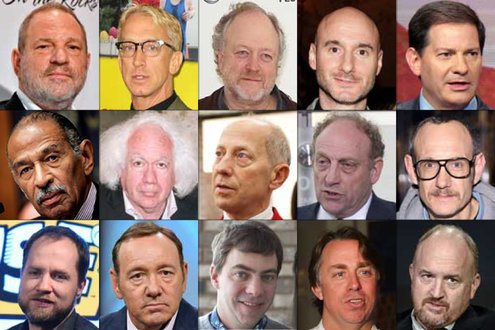NPR says it has already taken steps to bolster its workplace culture, including making changes to the complaint process, creating an anti-harassment support group, mandating in-person sexual harassment training and strengthening its human resources department.
The report suggested further steps, including conducting background checks and asking questions about prior sexual harassment issues during the hiring process, retaining an outside firm to investigate complaints and conducting a study of gender equity in pay and promotions.
Graphic
After Weinstein: 71 Men Accused of Sexual Misconduct and Their Fall From Power
A list of men who have resigned, been fired or otherwise lost power since the Harvey Weinstein scandal broke.

“We are committed to implementing its recommendations to ensure we have a workplace where everyone feels safe and respected,” Isabel Lara, an NPR spokeswoman, said in a statement. “The past months have shown that sexual harassment is a serious, widespread problem, pervasive in every industry and many organizations; NPR is no exception.”
The report said that some NPR employees had been warned about Mr. Oreskes’s behavior, but the knowledge stayed within a “whisper network” that didn’t extend outside the newsroom.
“As a result, information that many staff members felt was widespread actually was not known to HR or leadership,” the report said.
The timeline revealed by the investigation shows that NPR executives frequently expressed concern about Mr. Oreskes’s behavior, but repeatedly addressed it through conversations instead of disciplinary action.
When NPR hired Mr. Oreskes in March 2015, a search firm delivered “overwhelmingly positive” feedback, with no criticism of his workplace conduct, the report said. But a member of the eight-person hiring committee was aware of one episode and raised it to human resources: A woman said Mr. Oreskes had left her multiple voice mail messages late at night asking to discuss his book while they were at a conference. The woman said that she had heard a similar story about another woman at the conference and that “the incidents made the conference attendees very uncomfortable,” according to the report. Nonetheless, the committee unanimously voted to hire him.
Advertisement
Continue reading the main story
In the summer of 2015, two female NPR employees said they had dinners with Mr. Oreskes that turned excessively personal, the report found. He gave one of them a hug after dinner, which “made her feel uncomfortable,” the report said. They reported the dinners to human resources in October 2015, and the company’s general counsel, Jon Hart, spoke with Mr. Oreskes within a week.
“This conversation was described as a ‘stern talking to’ in which Mr. Hart told Mr. Oreskes that sexual comments were not appropriate and warned him that it could not happen again,” the report said. “Mr. Oreskes committed to Mr. Hart that it would not happen again.”
But in the spring of 2016, Mr. Oreskes expensed several dinners with women, including one with a female NPR employee, the report found. In August, Mr. Hart and Deborah A. Cowan, the chief financial officer, met with him and asked for business justifications for his dinners, while cautioning him to make sure he had justifications for dinners going forward.
Executives again discussed his behavior in October 2017, and they decided that Jarl Mohn, the chief executive, “would have an additional counseling session with Mr. Oreskes,” which he did, the report said.
“They decided not to terminate Mr. Oreskes at that time because there were only two reported incidents of conduct involving NPR employees and both had been addressed two years prior,” the report found.
After Mr. Mohn asked the staff to come forward with harassment complaints, an employee said Mr. Oreskes had groped her in the spring of 2017. Around the same time, a woman told NPR’s legal team that Mr. Oreskes had kissed her without her consent when he was employed by The Times.
He was suspended on Oct. 31 after the Washington Post article was published. Shortly after, an NPR employee said Mr. Oreskes had made an inappropriate comment in 2016 during a conversation about her career, and had invited her to his beach cottage to “continue the conversation over wine,” the report found. Mr. Mohn asked for his resignation after hearing her complaint.
Mr. Oreskes’s career in journalism stretches back about four decades. He started at The Daily News and joined The Times in 1981, holding many jobs in two decades at the paper, including chief political correspondent and deputy managing editor. He worked at The Associated Press from 2008 to 2015, serving as a vice president and senior managing editor.
Advertisement
Continue reading the main story
The newly released report, which was not edited by NPR employees, was based on interviews with 86 current and former employees, 71 of whom were women.
Reached by email on Wednesday, Mr. Oreskes said that the law firm that prepared the report did not ask to speak to him, but that he continued to support NPR and its mission.
He pointed to a statement he made on the day he resigned: “I am deeply sorry to the people I hurt. My behavior was wrong and inexcusable, and I accept full responsibility.”
Continue reading the main story
Article source: https://www.nytimes.com/2018/02/21/business/media/npr-michael-oreskes.html?partner=rss&emc=rss
Speak Your Mind
You must be logged in to post a comment.